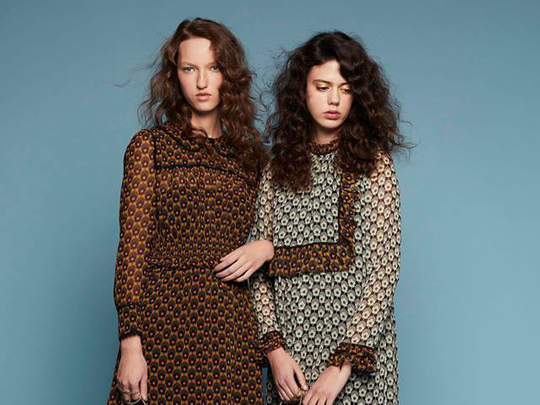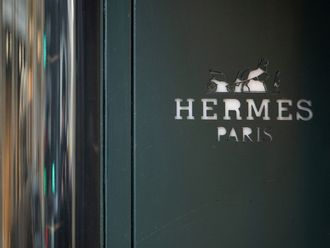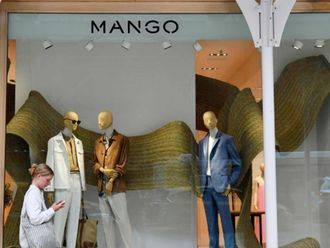
‘What happened was like a bereavement. To say I was upset is an under-statement. And then when malicious reports came out about the way we’d allegedly treated our staff, that was horrible and hurtful.”
This is the first interview Orla Kiely has given since her eponymous company went belly-up, and feelings are still raw. “We did everything we could to save the business we’d set up 23 years previously. To watch it fail was devastating,” she says.
When it was announced that Orla Kiely (pronounced, like the singer, Kylie) had gone bust in September last year, the nation was stunned. This was a quirky brand of pleasing, plant-based prints that we had taken into our hearts. Its collapse felt personal.
Then reports started filtering out that staff were abruptly frogmarched off the premises, salaries unpaid. I remember having conversations with girlfriends in which we felt shocked and saddened that Orla herself hadn’t done the honourable thing and dipped into her own flower-patterned purse to make sure her staff weren’t out of pocket.
Dublin-born Kiely looks stricken when I tell her this. “That is not what happened,” she cries. “It’s terrible that was the perception but everything was taken out of our hands. Once you go into administration, you have no input. It is illegal even to pay your staff. I would have done so immediately if I could, but it was impossible.”
We are sitting at the expansive kitchen table of her south London town house, where a double-height glass wall overlooks the garden and the family dogs lounge in the sun. The house is done out in midcentury modern, and her distinctively patterned homewares — a toaster covered in her familiar stem print, mugs, teatowels — are in use everywhere. There are also pieces of really rather fun furniture from her new collection, which launched on Saturday (more of which later).
For now, we are discussing events leading up to the fateful day when she and Dermott Rowan, her Irish husband, with whom she has two sons, shut up shop for good. Kiely, who was crowned “Queen of Prints” by the media, had always been the wellspring of creativity; Rowan was involved in the business side. The parent company they founded in the early 90s was called Kiely Rowan.
“Going into our store in Covent Garden was like stepping into a different world. I would often go in to meet customers and talk about what they did and didn’t like,” says Kiely. She is wearing one of her own patterned dresses that now qualify as vintage — no more will be made — and a pair of glasses from her branded spectacles range, due to go on sale in a few months.
“Interacting with the public was my favourite part of the business. There was always a lovely sense of excitement when I appeared, so I would always put on some lippy and one of my dresses, make sure I looked the part.”
Kiely, who was awarded an OBE in 2011 and has received a clutch of fashion awards and honorary degrees, began her career designing hats and moved on to work on handbags and a variety of items as diverse as watches, cars, and even a double-decker bus.
She received a Master’s degree from the Royal College of Art in knitwear, but it was her bold use of retro-style print on laminated fabric handbags that elevated her to a global brand.
The Duchess of Cambridge was a fan, and wore many of her dresses in public, as did her mother, Carole Middleton. Sarah Jessica Parker, Keira Knightley and Alexa Chung also lent the fabrics a hipster cachet.
Last summer, London’s Fashion and Textile Museum hosted a career retrospective entitled Orla Kiely: A Life in Pattern. The business went bust four days before the show ended.
“Nobody was marched anywhere,” Kiely says, with quiet vehemence. “That day was one of the worst in my life. Something my husband and I had built up from scratch was destroyed. Our staff weren’t just employees, they were friends. When we gathered everyone together, there were tears from all of us.”
In the months before that, Kiely and her husband had been keenly aware of problems, but they appeared no greater than pressures experienced by other high-street traders.
“Our expansion was an organic thing,” says Rowan. “We liked the idea of bricks rather than clicks, so we had shops. But our online presence was too low key, not sophisticated enough. We’ve always been self-financing, and when the retail side started to slump, we were exposed to the same pressures as everyone else. But we couldn’t rely on online sales to get us through.”
Those pressures are well-documented: high rents and rates, a drop in the value of the pound and changing consumer habits.
The couple’s response was to pump more of their own money into the business to tide it over. Kiely also focused on new designs. But the cracks in their business model could not be repaired. In September last year, they consulted administrators. The advice was to cease trading with immediate effect. As directors of the company, there was no other option but to enter into voluntary insolvency.
“Once that happens, things move very fast,” says Kiely. “I was powerless. The process took over and our employees had to be paid through the statutory framework that exists for that sort of situation.”
Shockwaves were felt across the country when the shops and website were closed down. As if that weren’t bad enough, Kiely found herself subject to endless media critiques over where she had gone wrong and how she had spread herself too thinly. She had put her designs on a Tesco “bag for life” and, in so doing, “cheapened” her brand. One commentator suggested it was “embarrassing” to turn up to a dinner party and discover your Orla Kiely outfit matched the hostess’s kettle. “Nobody’s frock ever matched a kettle, because our product ranges had different patterns,” she says, with a smile. She also dismisses the inherent snobbery in the criticism that her patterns were ubiquitous.
“As far as the breadth of our offering was concerned, bringing pattern and colour into everyone’s lives is a good thing. We agreed to the Tesco bag only because 50p from each one went to charity. Why not have a shopper that makes you smile?”
Though her clothing line has been discontinued and the walk-in stores are no more, the Orla Kiely licensing business is expanding. This means that she designs and has creative control over anything from window blinds to suitcases, manufactured by a partner in the field of soft furnishings or luggage, and sold by them.
A new Kiely-designed furniture line that deftly mixes plain shades with her familiar pattern is being sold through interiors company Barker and Stonehouse; a tomato-coloured sofa isn’t cheap at 1,115 pounds, although a linear stem cushion will only set you back by 35 pounds. But should good design be priced beyond the reach of the masses? Kiely thinks not.
“Everything we do is made with integrity and authenticity, and I hope that other people can feel it,” she says. “The colours and forms are those of my childhood in Ireland, where the gorse blazes yellow and there really are so many shades of green.”
It’s true that there is something spiritually uplifting about Kiely’s 150 or so nostalgia-infused patterns. “I’m designing more now than I was before,” she says. “The creative process still brings me joy.”
The obituaries for Orla Kiely the brand, it seems, were wide of the mark. Down, perhaps, but not out; the renaissance of stems and ferns and flowers has already taken root.














